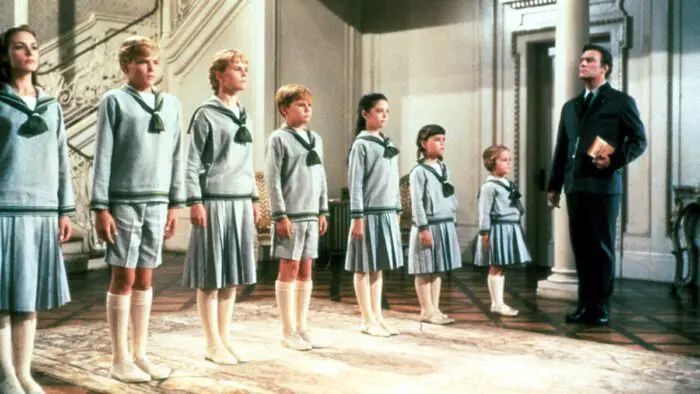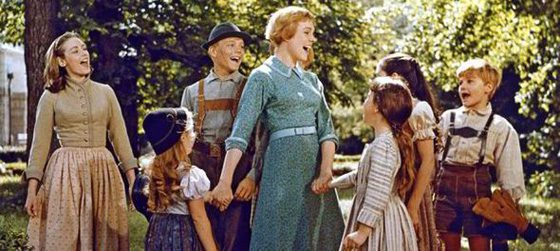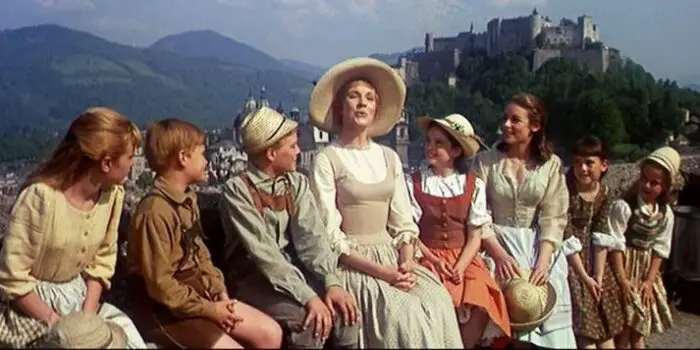Musicals are unusual and highly divisive, there’s no doubt about it, as they’re a very unique mixture of two mediums. Yes, all films have music to a degree but musicals take it much further by not only incorporating the soundtrack into the story, but also having the characters sing and/or dance to it and this can be problematic. It means that to elicit a positive response, not only does it need to have everything that a standard film has but also good, catchy songs that blend into the narrative naturally in both content and style. I feel that very few musicals have ever been able to do this successfully but The Sound of Music is definitely one of them.
Despite it’s very long but necessary runtime, this was one of the films I watched most as a young child. This might seem odd, especially as it sits next to Batman and Indiana Jones in this respect but I believe that the reason it appealed to me all the way back then as it does now is for the simple reason that the songs are brilliant. Written by Richard Rodgers and Oscar Hammerstein II, both in melody and lyrically, the soundtrack is not only perfect but memorable too. I challenge anyone to pick out a song that’s anything less than great. The range of different emotions and situations they cover whilst remaining consistent in tone is so impressive and compelling.
From sheer elation (“Title Song”, “My Favourite Things”, “Climb Ev’ry Mountain”), to genuinely touching (“Edelweiss”, “Something Good”, “Sixteen Going on Seventeen”) and even charming whimsy (“Do-Re-Mi”, “The Lonely Goatherd”, “So Long Farewell”). I know of no other musical that has so many hits in its soundtrack, it’s like a “Best Of” compilation. Upon its release, the OST album stayed at number one in the UK charts for over a year and in the top ten in the US charts for even longer. It became the best selling album in the UK in ‘65, ‘66 and ‘68, with Billboard declaring it the second greatest album of all time in 2015 after being reissued for the fifth time.

Every element of the film, which was based on a true story, is complementary to the music. It can’t be denied that it has a somewhat saccharine tone but like all the best endeavours, it commits to it fully and that’s why it works so well. The narrative, however, has a dark side to it that has many harsh moments throughout. The Von Trapp’s family dynamics when our protagonist Maria first joins them as a nanny, border on neglect. The father, Captain Georg, having lost his wife, has resorted to the only military methods he knows to try and keep all seven of his children in line…literally.
Set in beautiful Salzburg, Austria in 1938, during the uprising of the Nazis, it also has its share of bleakness and dread. This was the tense period when they seized Austria and its people had a difficult decision to make between compliance, fleeing their homes, or death. It’s this juxtaposition between the sweet songs and sometimes dark story that cements the film’s brilliance. Just after Maria finally manages to melt Georg’s heart with her unbridled optimism, they barely have time to take a breath before the threat of the Nazis is immediately upon them.
Julie Andrews may perhaps be the most loveable actress in history, commanding both respect and adoration simultaneously as Maria, a coveted role that also had Audrey Hepburn and Grace Kelly attached at different points. It’s no wonder that she works mostly these days playing/voicing Queens and also a mythical sea creature who chooses the King of Atlantis in Aquaman. Christopher Plummer (Georg), who’s still going strong today and you’ll recognise most recently as the head of the family/victim from Knives Out, is also perfect as the stoic Captain who gradually reveals a sensitive side throughout the story.

One of the children, Friedrich, is also played by Nicholas Hammond. For me, he was the first live-action Spider-Man in a string of TV movies that are so bad that they’re kind of good again and also popped up earlier in the year in Quentin Tarantino’s Once Upon a Time…in Hollywood.
The Sound of Music was a massive commercial and critical success upon its release in ‘65. In the US, it remained at number one at the box office for a whopping 30 weeks, with a four and a half year run; the viewing figures in some cities actually exceeded the population. It surpassed Gone With the Wind to become the highest-grossing film in the world (a title that it would hold onto for five years) and breaking records in 29 countries, having been translated into multiple languages. In the UK, it took double the amount of money of any previous film. It would go on to be one of the most profitable films of all time, adjusted for inflation, by today’s standards it took over 2.3 billion dollars.
It won many awards, including Oscars for Best Picture, Best Music and Best Director for Robert Wise, it took the Golden Globes for Best Motion Picture and Best Actress for Julie Andrews and even the Writers Guild of America Award for Best Written American Musical for Ernest Lehman. Basically, it was successful on all fronts; commercially, critically, in direction, writing and performance. It’s one of the films that’s achievements are difficult to comprehend, especially having not been around at the time. It truly is a classic that should continue to be celebrated.
The film’s impact can be felt throughout years right up until the modern-day, it often pops up in the most unlikely of places. My favourite example is when the lead singer (Ian Curtis) of my favourite band (Joy Division) is asked in one of the best biopics ever (Control) what his favourite film is. He thinks for a moment before saying: “I really like…The Sound of Music.” I never needed any validation but if I did, this would be all I need.
Another great example is when The Avalanches, who were responsible for one of my favourite albums ever (Since I Left You), came back after a hiatus of 16 years with the single “Frankie Sinatra.” Not only is it a banger that features the legendary MF Doom on vocals but what cuts in as a bridge between the final verse and the outro? Only a sample of “My Favourite Things.” Others might not realise where the sample is from but I most certainly did. A melancholic cover of “Edelweiss” is also used for the intro of The Man in the High Castle, an excellent TV adaptation of a Philip K. Dick book. The slower, darker tone and it’s juxtaposition to the original version is a perfect and powerful metaphor for the success of the Nazis in this alternative timeline’s narrative.
There have been multiple parodies of scenes from the film in sitcoms such as Family Guy and it’s said to be played twice an hour in heaven in Monty Python’s The Meaning of Life. It’s the favourite of Jim Carrey’s character in Kidding, who’s the real-life Santa of that world and of God himself in Bad Omens as well. The latter wasn’t a surprise—rather fitting and actually believable. I’ve seen The Sound of Music as an excellent theatre production and have also been to a sing-along screening of the film (which have become an international phenomenon) at my favourite independent cinema, The Prince Charles, which was a euphoric experience.

I attended both with a friend who has a habit of dropping “Do-Re-Mi” during parties that I’m also in attendance and then forcing me to sing it with her to the bemusement of all others around. My parents also made me and my brother perform “So Long Farewell” to friends and relatives when were kids, with much embarrassment. It seems history has a habit of repeating itself indeed.
The influence also spreads to other works by Rodgers and Hammerstein. I see it as no coincidence that songs from The King and I and Oklahoma have featured in two of my favourite TV shows, Twin Peaks and Watchmen respectively. Their work seems to touch a myriad of other things I love, solidifying it as an important part of my influences. If you haven’t had the pleasure of seeing The Sound of Music, I suggest leaving all negativity at the door and viewing whilst you’re at your most sentimental.




Thanks for reading and the kind words, I’m glad I could help! If you click on my name at the top or bottom of an article, it’ll take you to all my other posts. Enjoy!
Will do!
“I know of no other musical that has so many hits in its soundtrack, it’s like a “Best Of” compilation. ”
Watch Gypsy! sometime. The second act is one hit after another.